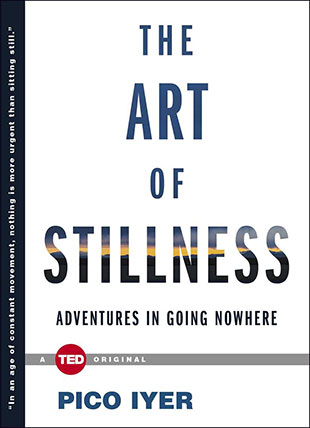"Yet, as [Leonard] Cohen talked about the art of sitting still (in other words, clearing the head and stilling the emotions) — and as I observed the sense of attention, kindness, and even delight that seemed to arise out of his life of going nowhere — I began to think about how liberating it might be for any of us to give it a try. One could start just by taking a few minutes out of every day to sit quietly and do nothing, letting what moves one rise to the surface. One could take a few days out of every season to go on retreat or enjoy a long walk in the wilderness, recalling what lies deeper than the moment or the self. One could even, as Cohen was doing, try to find a life in which stage sets and performances disappear and one is reminded, at a level deeper than all words, how making a living and making a life sometimes point in opposite directions.
"The idea has been around as long as humans have been, of course; the poets of East Asia, the philosophers of ancient Greece and Rome, regularly made stillness the center of their lives. But has the need for being in one place ever been as vital as it is right now? After a thirty-year study of time diaries, two sociologists found that Americans were actually working fewer hours than we did in the 1960s, but we feel as if we're working more. We have the sense, too often, of running at top speed and never being able to catch up.
"With machines coming to seem part of our nervous systems, while increasing their speed every season, we've lost our Sundays, our weekends, our nights off — our holy days, as some would have it; our bosses, junk mailers, our parents can find us wherever we are, at any time of day or night. More and more of us feel like emergency-room physicians, permanently on call, required to heal ourselves but unable to find the prescription for all the clutter on our desk."
